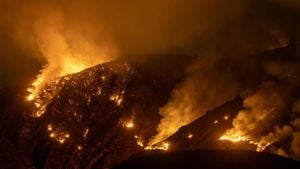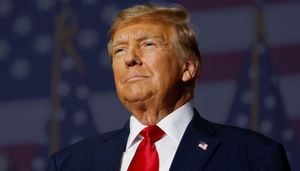Switzerland is contemplating sending 200 soldiers for peacekeeping duties along the border between Ukraine and Russia. This development, announced by Thomas Süssli, chief of the Swiss army, signals Switzerland’s readiness to engage in international peacekeeping amid rising tensions and conflict fallout.
A potential deployment could occur within the next nine to twelve months if certain preconditions materialize, particularly the establishment of a ceasefire between Russia and Ukraine. According to Süssli, any Swiss participation hinges on the agreement of both parties involved and the approval of the United Nations to oversee such operations.
Swiss neutrality historically has shaped its military engagement strategy, and this new consideration reflects the shifting dynamics of European security architecture. Süssli emphasized, "Peace enforcement means imposing peace by force. Switzerland does not participate in this." Instead, he noted, the focus would be on peacekeeping, which requires cooperation from all parties.
Switzerland has established precedent with previous peacekeeping missions, such as its involvement in Kosovo. Now, with the situation between Ukraine and Russia remaining volatile, Süssli explained how the Swiss military could prepare for deployment: "If we received the mandate to participate in a mission, we would develop a training concept to prepare our soldiers for engagement." This would involve equipping the troops with the necessary skills to handle peacekeeping responsibilities, including logistics and medical support.
The chief of the Swiss army acknowledged the complexity of drafting manpower to different international missions, citing existing commitments to supporting operations like those in Kosovo and Bosnia. He stated, "Currently, Swiss soldiers go to Kosovo or Bosnia for six months on rotation, and similar deployment could happen for Ukraine." This admissions highlights the challenge of maintaining readiness for new missions without compromising existing responsibilities.
The potential for Switzerland’s involvement could reflect broader themes of military cooperation among European nations. Although Switzerland has pursued peace and neutrality, recent geopolitical shifts require newfound strategies and partnerships. With discussions about NATO's presence intensifying, European leaders are likely to observe Switzerland's next moves closely.
For Süssli and defense planners, the stakes are high as they continue to monitor the situation on the eastern front. Key conditions for involvement would include the establishment of clear mandates and the operational needs dictated by the UN.” He reiterated the necessity of having clear guidelines and expectations for any forthcoming mission, ensuring Switzerland remains aligned with its neutral stance.
The essence of this peacekeeping effort, according to Süssli, will be shaped by the realities on the ground. He stated, "We must distinguish between peacekeeping and peace enforcement," illustrating the nuanced differences between facilitating peace through cooperation versus employing military strength. This distinction is viscerally important as Switzerland navigates its role within the global community amid increasing unrest.
Further complicity arises from the backdrop of growing skepticism about Russia’s intentions and the fragility of international agreements. Nevertheless, if conditions evolve favorably and peace negotiations occur, Switzerland's commitment to participate becomes clearer. Swiss military personnel are trained for such engagement, with the army's logistics and health services seen as valuable assets for potential operations.
Engaging with international peace efforts would require significant political discourse within Switzerland. Authorities will need to assess the public sentiment toward military presence overseas, particularly within conflict zones. The social climate surrounding peacekeeping remains sensitive, reflective of Switzerland's foundational roots of neutrality.
Should the political will align, and conditions be right, Switzerland's military could bolster UN efforts effectively. While risks remain, Süssli's proactive statements during interviews display Switzerland's sourcing preparedness for upcoming tasks if the diplomatic climate allows.
Challenges aside, this proposed military engagement could signal Switzerland's pivotal shift from passive neighbor to proactive peacekeeper. The dialogue around this initiative reflects not just Swiss political bureaucracies but wider European debates about defense, neutrality, and multinational cooperation.
With the potential deployment looming, the international community will watch how Switzerland balances its neutrality with active participation. At the heart of this discussion remains the very essence of peace—engaging constructively, monitoring conflict, as well as committing resources appropriately.
Time will tell how this peacekeeping endeavor will shape Swiss military policy and whether the political decision-makers will hold the mantle of ensuring stability at their new eastern front.



